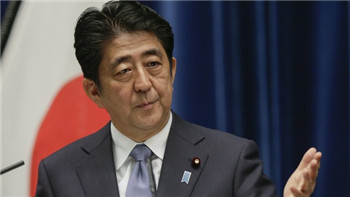
Standard & Poor’s has slashed its rating on Japanese debt from AA- to A+ in what it framed as an indictment of prime minister Shinzo Abe’s economic strategy.
标准普尔(Standard & Poor's)将日本主权债务评级从AA-下调至A+,并将之归咎于日本首相安倍晋三(Shinzo Abe)的经济战略。
The downgrade is unlikely to trigger any immediate turmoil in the Japanese government bond markets, which are driven by deflation and large-scale asset buying by the Bank of Japan.
此次下调不太可能立即引发日本国债市场的动荡。日本国债市场的主导因素是通缩以及日本央行(Bank of Japan)的大规模资产购买计划。
But the decision is likely to cause concern in Mr Abe’s office because S&P blamed it directly on disappointment with his economic policies.
但这一决定很可能会引发安倍内阁的关切,因为标普将此次下调直接归咎于安倍令人失望的经济政策。
“Economic support for Japan’s sovereign creditworthiness has continued to weaken in the past three to four years,” the agency said.
标普表示:“过去三四年,日本主权信用得到的经济支持越来越弱。
“Despite showing initial promise, we believe that the government’s economic revival strategy — dubbed ‘Abenomics’ — will not be able to reverse this deterioration in the next two to three years.”
“我们认为,尽管一开始曾展现出光明的前景,但日本政府的经济复兴战略——即所谓的‘安倍经济学’(Abenomics))——无力在未来两三年内逆转这种恶化趋势。”
Other agencies have tended to frame their downgrades as an automatic response to Japan’s growing public debt. Fitch cut Japan to an A rating in April. Moody’s cut Japan’s rating to A1, the same as an A+ from S&P, last December.
其他评级机构往往将它们对日本主权债务评级的下调归因于对日本公共债务日益增加的自然反应。今年4月,惠誉(Fitch)将日本的评级下调至A。去年12月,穆迪(Moody’s)将日本的评级下调至A1,相当于是标普的A+。
Japan has gross government debt amounting to 246.1 per cent of gross domestic product according to the International Monetary Fund, the highest of any advanced country, and a deficit of 6.2 per cent of GDP.
根据国际货币基金组织(IMF)的数据,日本政府债务与国内生产总值(GDP)之比为246.1%,在发达国家中排在首位,赤字则为GDP的6.2%。
S&P said the outlook on its rating is stable. Eleven months ago S&P had affirmed its high rating on Japan, saying a downgrade would be warranted only if economic growth stumbled.
标普表示,日本的评级展望为“稳定”。11个月前,标普维持了给予日本的高评级,表示只有在经济增长大幅下挫时才有理由下调。
It said Japan is still “relatively prosperous”, boasting a “diversified economy, political stability, and stable financial system”. But against this stands “a very weak fiscal position that the country’s ageing population and persistent deflation exacerbate”.
标普表示,日本现在仍“相对繁荣”,拥有“多元化的经济、稳定的政治以及稳定的金融体系”。但与此相对的是,“财政状况非常疲弱,而日益老龄化的人口以及持续存在的通缩令财政状况变得更加疲弱”。
Household consumption has been weak since Japan lifted its national sales tax from 5 to 8 per cent in April of last year. Mr Abe had tried with only mixed success to persuade companies to lift wages.
去年4月,日本将国内销售税率从5%上调至8%,此后家庭消费一直乏力。安倍曾试图说服企业上调薪资,但没有取得完全的成功。
Inflation was supposed to hit 2 per cent last April, under an unprecedented programme of monetary stimulus from the Bank of Japan. Instead, weak spending and a collapse in oil prices has thrown Japan back to the brink of deflation, a problem plaguing the country for nearly two decades.
在日本央行推出的空前货币刺激计划的推动下,通胀率本应在4月份达到2%。但疲弱的支出以及油价暴跌将日本推回到通缩边缘,通缩问题已困扰日本将近20年。











